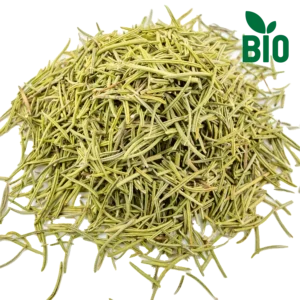In this article we will discover some basic facts about rosemary as an herb, some of the health properties of rosemary and some of its most common uses.
“There is rosemary, to remember me…” Ophelia (Hamlet, by William Shakespeare)
Rosmarinus officinalis – or, as of 2017, also known as Salvia rosmarinus1 – is a variety of the herb rosemary native to the Mediterranean region. It is widely used around the world and is one of the most popular forms of the herb. Although native to the Mediterranean region, rosemary has been naturalized in other parts of the world, including North America and China.
Rosemary grows as a shrub and has a strong fragrance somewhat similar to eucalyptus but at its woodiest. The herb can endure long periods of time without water and under normal conditions can live up to thirty years!

Because rosemary is an evergreen shrub, it is often used as an ornamental plant. Indeed, you will find it in many homes and gardens in Greece!
Rosemary has also been used as a symbol of memory/remembrance all over Europe and is especially found around graves or during war commemorations. The quote at the beginning of this article is from one of Shakespeare’s most famous plays, Hamlet, in which Ophelia highlights this traditional use of rosemary.
Photo: GPimages
Dried rosemary is a handy form of the herb and can be used both for tea and in cooking. When dried, the leaves of rosemary take on a lighter shade of green and become harder and more brittle, so they should be cooked sufficiently if used as a condiment to soften them so that they can be eaten pleasantly.
You will usually find dried rosemary leaves in three different “forms” – either whole, crushed or ground. Whole dried rosemary leaves are simply rosemary leaves that have been dried without being processed afterwards. Ground rosemary leaves have been ground and are in the form of powder.
Finally, ‘broken’ rosemary leaves are somewhere in between: the dried leaves are passed through a mill until they are about half a centimetre long. This makes them easier to use than whole rosemary in some cases.
Always remember that the dried form of any herb tastes stronger than the fresh form! So, when replacing fresh with dried rosemary, you only need to use about a third of the amount of fresh.

Rosemary has dark green needle-shaped leaves and white or purple flowers. Although dried rosemary leaves have a higher concentration of oils and fragrance, fresh rosemary leaves also have a remarkable aroma. Indeed, while fresh rosemary leaves are less strong than dried leaves, they also have a strong and distinctive flavor.
But it’s not just the rosemary leaf that is useful. Did you know that rosemary flowers are also edible? They make a nice little garnish for a salad or other dish!
Find out Rosemary’s health porperties
and taste our Dried Greek Rosemary
Now that you know more about this wonderful plant, let’s take a look at some of its properties…
Due to the high levels of flavonoids and phenolic acids in rosemary, the herb is rich in antioxidants. These antioxidants provide important benefits to the human body – from protecting our body’s organs and functions from damage caused by free radicals, to fighting premature skin aging.
By including the herb in your diet, you could benefit from the health properties of rosemary. At tofillo we like to take advantage of this by adding a few teaspoons of Dried Greek Rosemary to our favorite winter soups!
Rosemary contains high levels of phenolic acid and diterpenoid compounds. One of the various benefits of these compounds is their strong antibacterial properties. This means that rosemary has remarkable antibacterial properties and can – among other things – help heal minor wounds!
For millennia, people have believed that improving brain function is one of the properties of rosemary – and now this is supported by various scientific studies today. So, according to relevant studies, experiments on students have found that using rosemary essential oil through aromatherapy can help improve performance in exams.2
There are also studies that have shown that rosemary could help improve cognitive performance in people with Alzheimer’s.3
Further evidence of rosemary’s benefits for brain function was found in a 2018 study. In this study, participants drank water containing rosemary extract and researchers found that this also had a beneficial effect on their cognitive performance.4
Similarly, studies in 2012 and 2013 showed that rosemary extract could help treat and even prevent dementia, and generally improve cognitive function in older people.5 In addition, studies have shown that rosemary may have the ability to prevent brain aging, although further research is needed on this.6
Overall, there is considerable evidence to suggest that putting rosemary into our diets and our lives in general can greatly help our brain function and protect it from future decline.
It is also very interesting that research shows that rosemary can help mood and sleep quality. In a 2017 study, university students took a 500 mg rosemary supplement twice a day for a month. Researchers found that compared to a placebo, the rosemary supplement helped relieve symptoms of anxiety and depression and improved sleep quality.7
While more research needs to be done on this, this study gives a reason to consider using rosemary for mild mood and sleep concerns. Sure enough, our team at tofillo found that when we drink tea made with rosemary brewed with rosemary, we sleep a little more soundly at night
One of the properties of rosemary that has been traditionally practiced both in ancient and modern times is its ability to aid digestion. Indeed, the German Commission E (part of the Federal Institute for Drugs and Medical Devices) has approved the use of rosemary for the treatment of indigestion, commonly known as dyspepsia.8
At tofillo, we like to use Dried Greek Rosemary for a cup of tea after a heavy meal. We sit back, relax and let it settle our stomachs!
One of the properties of rosemary – quite amazing – is its ability to protect and promote eye health.
A 2012 study found that one of the key components of rosemary, carnosic acid, can have a big impact on improving eye health. Researchers suggested that rosemary could therefore play a role in clinical treatments for eye health issues such as age-related macular degeneration.9
So, it’s quite possible that including rosemary in your diet could help keep your eyes healthy!
Rosemary tea is a great drink both for its flavour and aroma.
It makes a great tea that feels nourishing!
We have explored some of the properties of rosemary above. Now let’s look at some uses of this wonderful herb so you can take advantage of these properties!
Rosemary tea is an excellent beverage for both its taste and its aroma. It tastes salty with a piney aroma, is a little bitter while at the same time gives off minty aromas. It is a wonderful tea with nutritional value!
By drinking rosemary tea, you can take advantage of the health benefits we discussed above, as well as some more specific to rosemary tea. A 2017 review of scientific studies found that using rosemary extracts – for example, in tea – could help control and lower blood sugar levels.10
As mentioned, the taste of rosemary is slightly piney and woody, sometimes even a little bitter. It goes well with many “hearty” foods and dishes, such as lamb, duck, sausage, stews, soups and turnips. It is also often used to flavour drinks. Rosemary is widely used both in home kitchens and in the culinary world. It is a staple of the French ‘Bouquet Garnis’ and ‘Herbs de Provence’. You will also find it in Italian kitchens where it is sprinkled over Foccacia or infused with olive oil.
Rosemary works particularly well as a seasoning for fish and seafood. You can use it either dried or fresh – fresh rosemary will give a slightly more citrusy flavor, while dried rosemary will be more piney and woody.
At tofillo, one of our favorite ways to use Dried Greek Rosemary is to make a rosemary and lemon fish rub for baked fish. It adds wonderful texture and flavor to the finished dish!
Many of the health properties of rosemary seen above can be obtained through its essential oil, especially through the use of aromatherapy. The properties of rosemary essential oil that through relevant research, include its ability to improve cognitive function, protect against Alzheimer’s disease, reverse hair loss, and relieve symptoms of stress.
To learn more about the benefits of rosemary oil and to read about the benefits of other essential oils, take a look at our previous article on this topic.
So, there you go! Some interesting facts, benefits and uses of the herb rosemary. We hope you found this article useful.
If you want to start putting a little more rosemary in your daily diet, take a look at our Dried Greek Rosemary product page where you can learn more about our product and place your order. We hope you enjoy it!
Rosemary tea promotes digestion, helps relieve stress, can improve blood circulation and enhance memory.
Add hot water (90oC temperature to 1-2 teaspoons of dried rosemary. Allow to infuse in a closed container for 5 minutes before straining.
In moderate amounts, rosemary tea is safe for the majority of people. However, excessive consumption can cause indigestion or allergic reactions in sensitive individuals.
Yes, you can drink rosemary tea daily in moderate amounts. As for any herbal tea, it is recommended that its continuous and daily consumption be interrupted from time to time. For example, drinking for three weeks, stopping for one week, drinking for another three weeks, etc.
There are studies suggesting that rosemary can improve brain function and memory.
Yes, rosemary tea is known to help promote digestion and relieve symptoms of indigestion.
You can drink rosemary tea at any time of the day, but many people prefer to drink it in the morning for its refreshing effect or after meals to aid digestion.
Yes, rosemary is rich in antioxidants, which can help protect the body from oxidative stress and premature aging.
In Crete you can find rosemary in the wild, as well as other Cretan herbs. A short film that presents in an excellent way the properties of herbs and especially rosemary (Rosmarinus officinalis).
1 https://www.mccormickscienceinstitute.com/resources/culinary-spices/herbs-spices/rosemary
2 https://pubmed.ncbi.nlm.nih.gov/32963731/
3 https://pubmed.ncbi.nlm.nih.gov/32963731/
4 https://journals.sagepub.com/doi/10.1177/0269881118798339?url_ver=Z39.88-2003&rfr_id=ori:rid:crossref.org&rfr_dat=cr_pub%20%200pubmed
5 https://www.liebertpub.com/doi/full/10.1089/jmf.2011.0005 and https://pubmed.ncbi.nlm.nih.gov/24080468/
6 https://pubmed.ncbi.nlm.nih.gov/26092628/
7 https://www.sciencedirect.com/science/article/abs/pii/S1744388117304723
8 Page 9 of https://www.ema.europa.eu/en/documents/herbal-report/assessment-report-rosmarinus-officinalis-l-aetheroleum-rosmarinus-officinalis-l-folium_en.pdf
9 https://www.eurekalert.org/news-releases/831584
10 https://www.ncbi.nlm.nih.gov/pmc/articles/PMC5622728/
Subscribe to our newsletter to stay informed about herbs, recipes, exclusive offers, and receive a 15% discount on your first order!

Ευχαριστούμε πολύ τα παρακάτω websites για τη συνδρομή τους σε επιπρόσθετο, ελεύθερο φωτογραφικό υλικό (free stock) που χρησιμοποιείται στην ιστοσελίδα μας:
Pixabay.com
Pexels.com
Unsplash.com
Freepik.com
Canva.com
Adobe.com
Σταύρος Δεβεράκης (Φωτογράφος)
Many thanks to the following websites for their subscription to additional, free stock photography used on our website:
Pixabay.com
Pexels.com
Unsplash.com
Freepik.com
Canva.com
Adobe.com
Stavros Deverakis (Photographer)